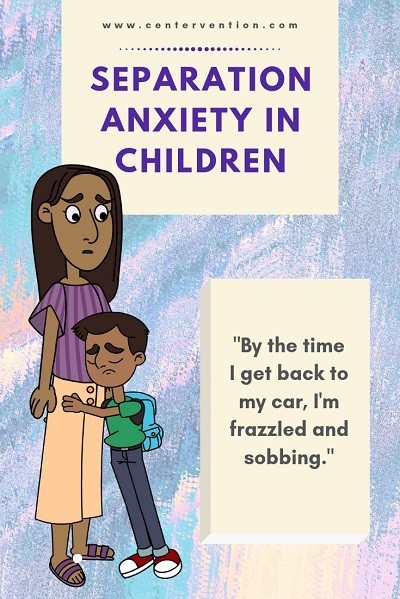
Separation anxiety, the fear of being away from mom, dad or another caregiver, can pop up unexpectedly and at various points throughout a child’s development.
Those morning transitions can be messy, ugly and sad, but adults should take heart, said Jennifer Miller, an expert in social and emotional learning and author of Confident Parents, Confident Kids. It’s a normal part of a child’s development.
“It’s representing a new level of social awareness,” Miller said. “As social awareness increases, so too does social anxiety.”
And while the morning transition from home to school is a common time for separation anxiety to appear, children who worry about being away from home may demonstrate it at other times as well.
They might refuse to go to play dates and camps, for example, or have trouble falling asleep, said Dr. Michelle Curtin, a developmental-behavioral pediatrician at Riley Hospital for Children at Indiana University Health, in an article on the topic.
What’s critical to remember is this: We need to help them face their fears. “If parents allow their kids to avoid everything that makes them anxious, they may be left with a very limited world—and they won’t learn how to move past their anxieties,” Curtin said in the article.
How Educators Can Help Students With Separation Anxiety
Cool Down Corner
A great way to student transitions from home to the classroom is to give them an activity to complete before group lessons begin. This will help the student focus on the task at hand versus being stuck in a cycle of thoughts that contribute to their anxiety.
One suggestion is to have them log in to Centervention’s free Cool Down Corner. Once logged in they can complete an SEL Check In and one or more of the activities.
Morning Meetings
We encourage educators to begin each day with a quick morning meeting to help students center their attention on the day ahead. And this can be especially important for students that struggle with separation anxiety. By giving students a sense of belonging, as part of your classroom and the group, they will worry less about being away from the security of their family.
And more specifically, you can have a morning question focus on something that provides insight into themself and/or their home life. Examples include:
- What do you like to do the most when you are not at school?
- What is your favorite movie of all time?
- What are you the most proud of?
Tips For Parents To Help Reduce Separation Anxiety
If your child is experiencing separation anxiety, here’s what Miller recommends you do to combat it.
Get them excited about the day
Take the focus off drop-off and on the day ahead, Miller said. Talk about all the good things that will happen, such as the chance to play with a new friend or take part in an activity they’ve talked about. “Excitedly anticipate the goodness of the day,” Miller said.
Give them a reminder of you
It might be a tiny piece of a blanket or T-shirt that you’ve slept with and smells like you. Whatever it is, it should be a small, tactile memento of you. “Something that she can stick her hand in her pocket to feel or put up against her face when she’s feeling sad,” Miller said.
Explain exactly when pickup is
Don’t say that you’ll be there at the end of the day or even at noon or 3 p.m. Instead, said Miller, talk to them about pickup time in terms of what activities they’ll be doing immediately before you see them again. So, said Miller, if you’ll see them after lunch, tell them, “‘OK, you’ll eat lunch and then I’ll be there.’”
Check in with the teacher
After drop-off, find out from the teacher how soon your child settled down after you left and how the rest of their day went. Children often pull themselves together very quickly after mom or dad leaves. And, eventually, those morning transitions will become easier.
“Positively anticipate the day and do all your preparations,” Miller said. “It will extinguish after a while.”
Build excitement
“Ask the teacher or caregiver if your child can bring a show-and-tell item, so they anticipate and really get excited about something they are going to show the rest of the class. You want them to hotly anticipate the day, not just focus on missing you.”
Jennifer Miller, Expert in social and emotional learning and author of “Confident Parents, Confident Kids”
Make it familiar
“On those nights when kids just can’t seem to finish a project, it’s time to set some boundaries. If your kid is working until all hours of the night, you might have to get in there and set some rules. Give them a half hour warning. Say, ‘We’re going to power down. If your work isn’t perfect, that’s OK. If you want me to let your teacher know I told you that you have to go to sleep, we can write an email together.’ If it’s a younger child, you can write it for them.”
Dr. Gail Saltz, clinical associate professor of psychiatry at the New York Presbyterian Hospital, via U.S. News and World Report
Help them confront their fear
“Let your child know that it is OK to make mistakes. Do not expect perfection from your child. Mistakes are for learning and they are good. As a whole, our culture expects far too much perfection from children. Don’t get caught up in that. Talk to your child about how mistakes are part of the learning process.”
Andrew R. Eisen, Linda B. Engler and Joshua Sparrow: “Helping Your Child Overcome Separation Anxiety and School Refusal“
